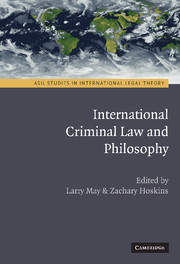Book contents
- Frontmatter
- Contents
- List of Contributors
- Introduction
- PART ONE SOVEREIGNTY AND UNIVERSAL JURISDICTION
- PART TWO CULTURE, GROUPS, AND CORPORATIONS
- PART THREE JUSTICE AND INTERNATIONAL CRIMINAL PROSECUTIONS
- 7 Postwar Environmental Damage: A Study in Jus Post Bellum
- 8 On State Self-Defense and Guantánamo Bay
- 9 Politicizing Human Rights (Using International Law)
- PART FOUR PUNISHMENT AND RECONCILIATION
- Index
- References
8 - On State Self-Defense and Guantánamo Bay
Published online by Cambridge University Press: 19 January 2010
- Frontmatter
- Contents
- List of Contributors
- Introduction
- PART ONE SOVEREIGNTY AND UNIVERSAL JURISDICTION
- PART TWO CULTURE, GROUPS, AND CORPORATIONS
- PART THREE JUSTICE AND INTERNATIONAL CRIMINAL PROSECUTIONS
- 7 Postwar Environmental Damage: A Study in Jus Post Bellum
- 8 On State Self-Defense and Guantánamo Bay
- 9 Politicizing Human Rights (Using International Law)
- PART FOUR PUNISHMENT AND RECONCILIATION
- Index
- References
Summary
INTRODUCTION
The United States is currently implementing a policy of indefinite imprisonment at detention facilities such as Camp Delta at Guantánamo Bay, as well as at numerous “black sites” around the world, for persons it deems enemy combatants. Since its inception in 2002, there have been approximately 800 such detainees at Guantánamo Bay. These enemy combatants are not treated as prisoners of war, and only a few have been charged with a crime. After seven years, only three detainees have been convicted of a crime. Many of the detainees have been, or were, held for years without any substantial review, and many have been subject to torture, or torture-like, techniques. According to former United States Secretary of Defense Donald Rumsfeld, an architect of the policy, it makes sense to imprison these people indefinitely because they are “hard core, well-trained terrorists.” Former Vice President Dick Cheney has stated that the detainees are “the worst of a very bad lot. They are very dangerous. They are devoted to killing millions of Americans.” President George W. Bush justified this policy of indefinite imprisonment for reasons grounded in a right of national or state self-defense. The policy, it was argued, was necessary to prevent future terrorist attacks similar to those of September 11, 2001.
The U.S. policies concerning indefinite imprisonment of non-U.S. citizens at Guantánamo Bay and at black sites have received much criticism, including criticism from the UN and other states. This criticism largely stems from concerns over violations of human rights (e.g.
- Type
- Chapter
- Information
- International Criminal Law and Philosophy , pp. 153 - 179Publisher: Cambridge University PressPrint publication year: 2009



